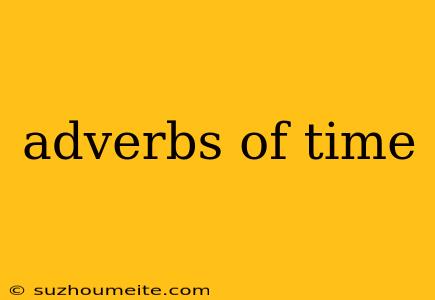Adverbs of Time: Guiding You Through the Flow of Time
Adverbs of time, as the name suggests, provide information about when something happens. They are essential for creating a clear and vivid narrative by indicating the sequence of events, the duration of actions, and the frequency with which they occur. Let's delve into the world of these versatile words.
Understanding Adverbs of Time
Adverbs of time answer the question "when?" They can be categorized into several groups, each offering a specific aspect of time:
1. Specific Time: These adverbs pinpoint an exact time, such as:
- today: I'm going to the library today.
- tomorrow: We'll discuss this tomorrow.
- yesterday: I met your friend yesterday.
- last night: I watched a movie last night.
- next week: I'm leaving for vacation next week.
2. Duration: These adverbs indicate how long an action lasts, for example:
- always: She always smiles.
- never: I never drink coffee.
- forever: They will be friends forever.
- already: I have already finished my work.
- still: I am still waiting for you.
3. Frequency: These adverbs tell how often an action occurs:
- often: We often go to the park.
- sometimes: I sometimes eat junk food.
- rarely: She rarely speaks about her past.
- usually: He usually wakes up early.
- weekly: They meet weekly to discuss their plans.
4. Order of Events: These adverbs clarify the order in which events happen:
- first: First, I'll go to the store.
- then: Then, I'll cook dinner.
- finally: Finally, I'll relax.
- later: We'll talk later.
- afterwards: Let's go to the beach afterwards.
Placement of Adverbs of Time
The placement of adverbs of time in a sentence can vary, but it's crucial to consider the impact on clarity and emphasis:
- At the beginning of a sentence: This emphasizes the time aspect. Later, I'll tell you everything.
- At the end of a sentence: This is the most common placement. I'll tell you everything later.
- Between the subject and verb: This can be used for emphasis. I always tell the truth.
Conclusion
Adverbs of time are powerful tools that help us understand the flow of events. By incorporating them into our writing and speech, we create a more dynamic and engaging narrative, providing readers with a clear picture of the time frame and sequence of actions.
